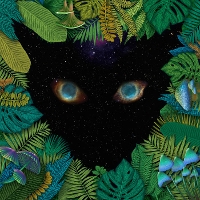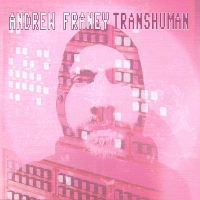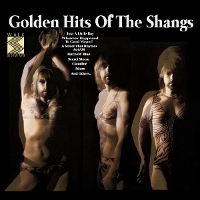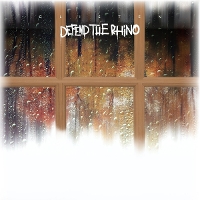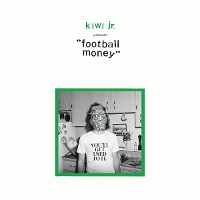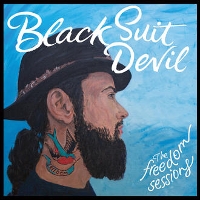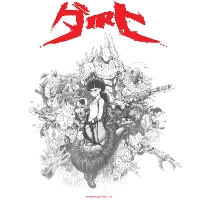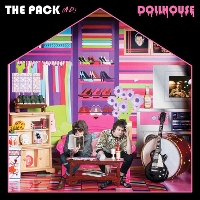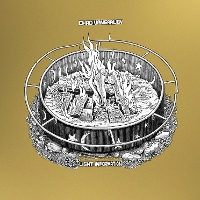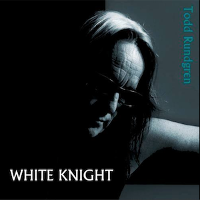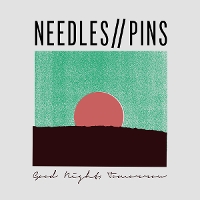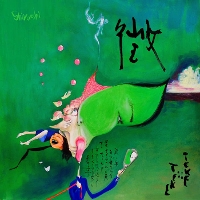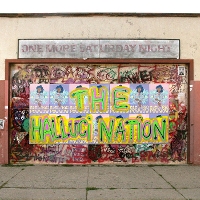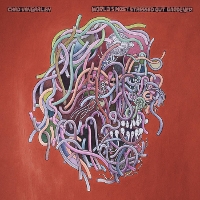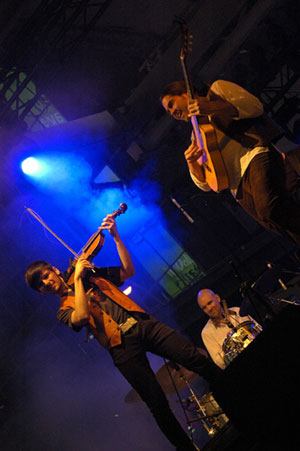
Tambura Rasa: On The Wild 'Silk Road,' All Signs Pointed Towards The West Coast
Ivan Tucakov Has Traveled the World Looking For Different Styles of Music, But Vancouver Was the Right Place for This Band to Fit It All Together
When Ivan Tucakov (pronounced EE-van Toots-a-COFF), the man behind Tambura Rasa, answers the phone, his pleasant Serbian accent is interrupted by chuckling. Ivan is in the middle of a chess match with his father. Right before Tucakov picked up the phone, he had nearly checkmated his Dad. His father, Ivan admits, is typically the winner. Then he reveals that this checkmate gambit was a last ditch move. Father Tucakov has taken Ivan’s queen. So it is a good time to do the interview. Ivan has a good excuse to exit the game gracefully.
Scott Wood: Tambura Rasa is an interesting name.
Ivan Tucakov: Initially what I wanted to do was a twist on words with a pretty common philosophical concept called tabula rasa. , which back in somewhat ancient times, during the Greeks and Romans, represented the concept of a “blank slate”—a person who is born is influenced by the outside environment and the person’s personality gets shaped based on that. So what I wanted to do, at the time, is to do a spin on words to include that expression with the word tambura, which means guitar, or a type of guitar in the Balkans. So what I want to say is that I am the leader of the act—I play guitar and then I bring in the influences of various sorts of cultures and create a whole new style of music.
Scott Wood: Can you introduce your band to demonstrate the various influences that you have assembled?
 I think "World Fusion" is probably the best term to throw out, if people are
not familiar with this style of music, because it is descriptive enough for
people to get an idea of what it's all about. I think one of the biggest influences
in the music is Balkan music and also Latin, specifically flamenco and then
from there we branch out to Middle Eastern which is kind of raqs sharqui style,
there's African, and then we go further out east.
I think "World Fusion" is probably the best term to throw out, if people are
not familiar with this style of music, because it is descriptive enough for
people to get an idea of what it's all about. I think one of the biggest influences
in the music is Balkan music and also Latin, specifically flamenco and then
from there we branch out to Middle Eastern which is kind of raqs sharqui style,
there's African, and then we go further out east.
Ivan Tucakov: Yeah! On violin, we have Michael Fraser, who brings complete gypsy jazz flair into the act. It’s a total pleasure to have him, because he gives exactly what the band needs in order to give it sort of a gypsy and a really world feel. And then we have John Bews on bass, Trevor Grant on drums and Robin Layne on drums. Basically, if we ever do a show where people need to dance, that’s where it comes from. They are really in charge of keeping a solid groove. On top of that, we have dancers. We have belly, flamenco and samba dancers. They do various choreographies around the compositions that we do that involve that sort of that style. And of course, we always have guest musicians as well—when it is appropriate!
Scott Wood: Wow. That is quite a mix.
Ivan Tucakov: Yes—especially, this past year—it has really grown. In the past year, we have been really pushing boundaries. We are currently working on five or six new compositions that we plan to feature in our upcoming shows. We are pushing the limits of playing with different odd rhythms and introducing new styles of music, even different formations of scales, and how the guitar works with the violin together and then how that pans out with the drums and the bass and how it comes back all together. The band is starting to be in a situation where every single musician in the band is someone irreplaceable and is essential for the band to sound as we envision it right now. So it is a total pleasure to work with everyone on board.
Scott Wood: When I was researching for this chat, I discovered that there were a lot of terms for what you do tossed around. “World Beat” and “World Fusion” are the two most popular. What do you call what you do?
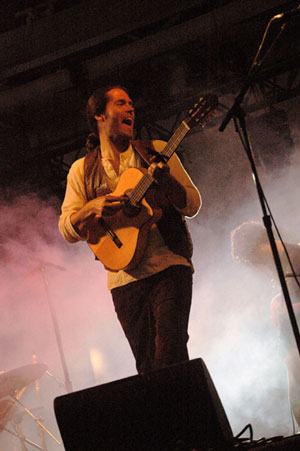
Ivan Tucakov: I think “World Fusion” is probably the best term to throw out, if people are not familiar with this style of music, because it is descriptive enough for people to get an idea of what it’s all about. I think one of the biggest influences in the music is Balkan music and also Latin, specifically flamenco and then from there we branch out to Middle Eastern which is kind of raqs sharqui style, there’s African, and then we go further out east. I usually like to call it Balkan Flamenco, this is a good expression because these are the two dominant styles. Another one is the music of the “Silk Road”—“Silk Road” kind of represents all the areas where these musical styles kind of travel along or exist along. “Gypsy Fusion” is a good one as well. So those would be the styles that I find myself also using, but “World Fusion” is something that I just tend to stick to—just because it works.
Scott Wood: Ok, I like the “Silk Road” idea myself, but “Gypsy Fusion” is not bad either. In any event, Ivan, you have an incredible background in terms of where you have lived and traveled. Can you tell us a little bit about your travels and how they have shaped your music?
Ivan Tucakov: I think that the main way the music got shaped was in a way that I did not get involved in playing this sort of music until I left both of the countries I have spent most of my life in, which is Turkey and Serbia. It’s almost like I got a chance to observe the cultures and live in those environments first before starting to experiment with what musically they represent. So, I lived it and then once I got to Canada, I’m like, “Huh. Based on where I’ve been around now that I’m in Canada, I can meet a lot of familiar musicians who can bring in different cultural influences. I can bring to the table whatever has shaped me up to now.”
 The main way the music got shaped was that I did not get involved in playing
this sort of music until I left both of the countries, Turkey and Serbia.
It's almost like I got a chance to observe the cultures and live in those
environments first before starting to experiment with what musically they
represent.
The main way the music got shaped was that I did not get involved in playing
this sort of music until I left both of the countries, Turkey and Serbia.
It's almost like I got a chance to observe the cultures and live in those
environments first before starting to experiment with what musically they
represent. 
Scott Wood: What made you go back to this music once in Canada?
Ivan Tucakov: To be honest with you, I am not sure. It just felt right. Mainly, I switched myself from a metal string guitar to nylon strings. Once I did that, for some reason it just spoke to me and I decided to develop my right hand technique, so I traveled to Spain to study Flamenco, because I realized what vast amount of techniques they have for the right hand in Flamenco music, which inevitably made the music sound Flamenco in many ways. I also really really enjoy that style of music. I also met some musicians in the early years that I was here, with whom I could really collaborate on that level. I don’t think I had that chance when I was living back in Europe. And it just took off from there. The more I was experimenting with it, the more people I met—new musicians who could do different things. And the more I met, the more I was like, “Wow.” Rather than thinking in one zone and doing one style of thing, I can just go all out and do all sorts of things. And that was very very encouraging and inspiring. It just worked for me for some reason.
Scott Wood: Since you blend so many styles in your work, can you compare an instance where two styles didn’t come together all that well, with a time where mixing worked better than you could have imagined?
 What we have really been liking doing is odd Balkan rhythm styles. 7s is one
of the rhythmical styles we just love. We're introducing 9s right now...and
that's been just a complete blast!
What we have really been liking doing is odd Balkan rhythm styles. 7s is one
of the rhythmical styles we just love. We're introducing 9s right now...and
that's been just a complete blast! 
Ivan Tucakov: Yeah! There’s a specific song “Tambura Pana,” for example on our Kamanala CD that I love. For some reason, that song was leaning towards a more relaxed reggae-ish feel and we’ve pretty much taken a step back from that genre because we realize as a while that we tend to do way better if we have more of a latin grooves style type of music rather than a relaxed reggae-ish offbeat thing. It’s definitely filtered out certain styles of music. We’ve stepped away from doing bluesy swing style of music as well.
What we have really been liking doing is odd Balkan rhythm styles. 7s is one of the rhythmical styles we just love. We’re introducing 9s right now—and that’s been just a complete blast! So, the more we experiment with different kinds of music, we’re noticing—especially with the set up we have right now—that certain styles really seem to work well for us, just because it’s probably a combination of types of styles of music that everyone brings in and everyone’s comfortable with. And when we notice that, we tend to be like, “You know what? This really works. Let’s stay with it and develop it even further”—rather than try to go somewhere where it just doesn’t work as well.
Scott Wood: Since you have followed your music’s path all over the world, what keeps you in Vancouver?
Ivan Tucakov: At this point, it is really the musicians I have come across to work with. It’s a great town to have a base. Some people go out east to be in Toronto, for the sake of having more exposure and the ease of travel around. We will be travelling to Ontario to see how things go over there. It will be the first time we have explored out east. Then I’ll probably get a sense of how things would work for us out there. Hopefully one day, we’ll get to Europe. For now, Vancouver is a good base. My family is here. This is another good reason. Also, I love being close to the ocean. I know that there are very few towns out there in the world that have such an access to this freshness of being next to the open water. And I think I get a lot of inspiration purely based on that.
Scott Wood: You just put out your latest record called Adsum on March 7th. The English dictionary defines "adsum" as an interjection. How does this relate to the music?
Ivan Tucakov: Adsum in Latin translates to "Being in the present". The CD was recorded live off the floor, with very minimal overdubs in few songs to add a bit of depth. The recording of it really needed to have us be fully present in order for it to translate the way it did. It worked out great! We hope to bring the same "Adsum" feel for all our future live shows and more recordings too.
Scott Wood: What has got you excited about the songs on the new record?
Ivan Tucakov: The energy that came through recording it all together at the same time. The rawness of the sound, the feel. We are all super proud of this album. The production and mixing was a fully collective effort, which in our case landed itself with a very satisfying result. It is a very unified sound, the way the record sounds is the way our fans will experience us live. And it still includes all the fusion of rhythm, tempos, and different musical styles around the world.
Ivan and Tambura Rasa invite everyone in Vancouver to the CD release party for their new record Adsum on April 7th 2011 at The Red Room. Not only will the band be there in full force, but Ivan promises to bring flamenco, belly and samba dance troupes to the party! See you there.
The Interview Show is everywhere.
Follow me on twitter @interview_show
Listen to The Interview Show on SoundCloud soundcloud.com/interviewshow
SoundCloud RSS Feed
www.cjsf.ca (Vancouver, BC, Mondays 4:30-5pm PST and Wednesdays 12:30am PST)
www.ckdu.ca (Halifax, NS, Saturdays 1:30-2:00am AST)
www.radiocfxu.ca (Campus Community Radio, Antigonish, NS, Fridays 11pm-12am AST)
www.cfru.ca (University of Guelph Radio, ON, Tuesdays 3pm EST)
www.umfm.com (Winnipeg’s Hit Free Radio, Fridays 6-6:30pm CST)
www.caperradio.com (Cape Breton University Radio, NS, Wednesdays 3-3:30pm AST)
www.localfm.ca (Campus Radio Saint John Inc., NB, Tuesdays 11:30am and Fridays 3:30pm AST)

